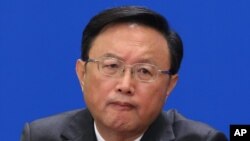The United States and China discussed the sensitive topic of cyber security during the first of four days of talks aimed at expanding cooperation between the two world powers.
U.S. officials say they raised the issue of economic-related hacking during the Monday session in Washington. They also said the two sides discussed international norms for cyber space.
Cyber security has threatened to become a major irritant in bilateral relations. The Obama administration has accused China of involvement in a broad Internet hacking campaign to steal secrets from U.S. government institutions and businesses for economic gain.
Officials hope to make progress before senior ministers of the two sides hold annual security and economic talks in the U.S. capital Wednesday and Thursday.
Yang Jiechi, a high-ranking Chinese official who is one of two leaders heading Beijing's delegation, said he hopes the dialogue can create more cooperation between the U.S. and China.
In a Tuesday editorial in the Washington Post, Yang downplayed Beijing's disagreements with Washington, saying the two sides "have ample wisdom to manage their differences and frictions."
He cited progress in several areas, including the nuclear issues in North Korea and Iran, counterterrorism, climate change, and the international financial crisis. He said cooperation on such matters is "an anchor for world peace and stability."
But significant disagreements remain over issues such as China's human rights record, which U.S. officials bring up every year at the dialogue -- to the dismay of Beijing.
The two sides also traditionally disagree over economic issues. The U.S. wants China to further open its economy to foreign competition and allow the value of its currency to rise. China, meanwhile, wants the U.S. to loosen restrictions on Chinese investment.
Mike Chinoy, a senior fellow with the U.S./China Institute at the University of Southern California, expects the Washington dialogue to produce little in the way of concrete agreements.
"The indications are that there are not going to be any dramatic deliverables at this meeting," Chinoy said. "But if the process allows the two sides to begin to talk in more detail, to understand each other better, that's the first step toward managing these issues."
The talks come just weeks after an informal summit in California between Chinese President Xi Jinping and U.S. President Barack Obama - a meeting that was hailed as a success by both sides.
But the relationship has been complicated by National Security Agency leaker Edward Snowden. The Obama administration has implied China had a role in Hong Kong's decision not to extradite Snowden to the U.S. on espionage charges.
For its part, Beijing has been upset by some of Snowden's leaks that claimed U.S. spies had hacked Internet traffic in China and its autonomous region Hong Kong for years to gather intelligence.
Chinese officials have used the reports to bolster their case that China is a victim, not a perpetrator, of cyber attacks.
U.S. President Barack Obama has insisted there is a distinction between intelligence gathering activities that many nations conduct and stealing trade secrets for commercial advantage.
U.S. officials say they raised the issue of economic-related hacking during the Monday session in Washington. They also said the two sides discussed international norms for cyber space.
Cyber security has threatened to become a major irritant in bilateral relations. The Obama administration has accused China of involvement in a broad Internet hacking campaign to steal secrets from U.S. government institutions and businesses for economic gain.
Officials hope to make progress before senior ministers of the two sides hold annual security and economic talks in the U.S. capital Wednesday and Thursday.
Yang Jiechi, a high-ranking Chinese official who is one of two leaders heading Beijing's delegation, said he hopes the dialogue can create more cooperation between the U.S. and China.
In a Tuesday editorial in the Washington Post, Yang downplayed Beijing's disagreements with Washington, saying the two sides "have ample wisdom to manage their differences and frictions."
He cited progress in several areas, including the nuclear issues in North Korea and Iran, counterterrorism, climate change, and the international financial crisis. He said cooperation on such matters is "an anchor for world peace and stability."
But significant disagreements remain over issues such as China's human rights record, which U.S. officials bring up every year at the dialogue -- to the dismay of Beijing.
The two sides also traditionally disagree over economic issues. The U.S. wants China to further open its economy to foreign competition and allow the value of its currency to rise. China, meanwhile, wants the U.S. to loosen restrictions on Chinese investment.
Mike Chinoy, a senior fellow with the U.S./China Institute at the University of Southern California, expects the Washington dialogue to produce little in the way of concrete agreements.
"The indications are that there are not going to be any dramatic deliverables at this meeting," Chinoy said. "But if the process allows the two sides to begin to talk in more detail, to understand each other better, that's the first step toward managing these issues."
The talks come just weeks after an informal summit in California between Chinese President Xi Jinping and U.S. President Barack Obama - a meeting that was hailed as a success by both sides.
But the relationship has been complicated by National Security Agency leaker Edward Snowden. The Obama administration has implied China had a role in Hong Kong's decision not to extradite Snowden to the U.S. on espionage charges.
For its part, Beijing has been upset by some of Snowden's leaks that claimed U.S. spies had hacked Internet traffic in China and its autonomous region Hong Kong for years to gather intelligence.
Chinese officials have used the reports to bolster their case that China is a victim, not a perpetrator, of cyber attacks.
U.S. President Barack Obama has insisted there is a distinction between intelligence gathering activities that many nations conduct and stealing trade secrets for commercial advantage.
